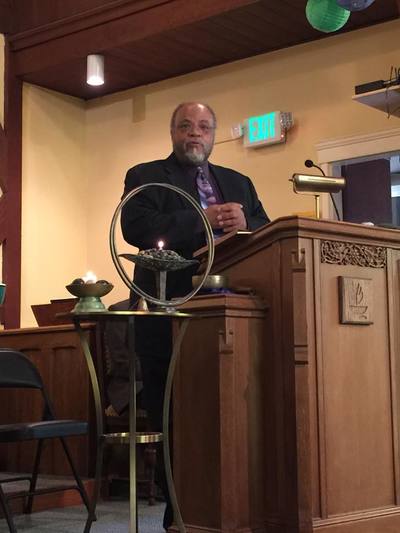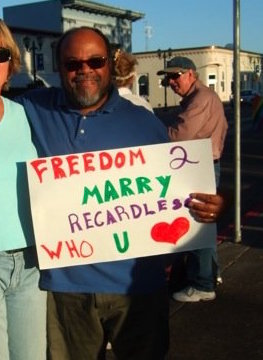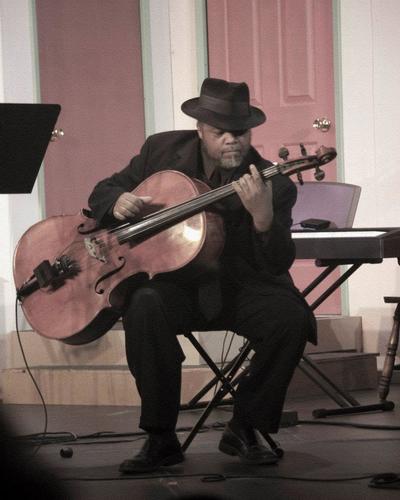Justice through Creativity...
|
The End of God-Talk, An African American Humanist Theology – Anthony B. Pinn Paraphrasing from one of the storybooks (19) Pinn referred to, and correcting for gender bias: “God is love and they who abide in love abides in God and God in them”. (1 John 4:8,16 ) We human beings are at our magnificent best when we are in love. That state is shared, and from within it, we are connected to other beings through time and space.
As I read Pinn a question began to creep in from the margins: “Where is love in this man's universe?” The word appears five times in the text: twice in relation to King’s “Beloved Community”(46), once quoting Thurman (78) and two times quoting others in the notes and bibliography. Pinn does not write about love from his perspective! No wonder why I needed to take a 7 hour break doing music after reading the first two chapters of “The End”. I was sucked dry by African American nontheistic humanist theology and its “embodied self and the nature and meaning of its occupation of space and time.” (62) The anthropological emphasis on the uncertain ups and downs of life having significance had me screaming for (63) William Jones’ heartfelt warmth, who’s rejection of the little god still held a place for something bigger.[A] His struggle with god is much more satisfying than Pinn’s more poisonous indifference. By Chapter 6, Pinn goes some way to redeem his bleakness with the notion of celebration and ritualization to achieve “complex subjectivity”. I resonated with his approval of the UUA as a good p(l)ace for humanist leaning people of color like me. I do not feel that I need to “surrender” my embodied self in the UUA. (141) In fact, I wish to assist other people of color to jump into the UUA pool. The water can be warmed. I offer another perspective rather than Pinn’s discussion of humanist writers. Instead of asking questions about what constitutes sacred space and the structuring of “religious thought and engagement” (with “... and”), I believe the more important question is “What do we humans love?” Yo-Yo Ma played the Bach Unaccompanied Suites for thousands of people at the Mexico/United States border the day before fire broke the back of the Notre Dam cathedral in Paris. Ma managed to unite millions of people over a very human issue with music written by a composer who died 269 years ago and who wrote “Soli Deo Gloria” at the bottom of all of his manuscripts. Ma was in love while he was playing the cello for people at the border (he always is). We cellists like to say that God plays the cello through Ma. As a professional cellist and composer I am “embodied” in the forms and shapes of music. Like a physicist seeking elementary particles only to find traces of God smiling back, composers dance in the same stream that is propelled by love. The composer in me can tell with certainty what Debussy had for breakfast the morning he composed a piece of music because I am connected in time to him through the choices he made using the same rules that govern the twelve notes he had to work with. Community created through orchestras, and the composers who write music for them, is one of the most powerful expressions of the “magnificence” I write about. The community of musicians is vast over space and time. It is driven by the love of encapsulating moments that can be communicated through human bodies in motion. I compose music for the people who will voyage to the stars. I like to think they will be listening to my music 300 years from now. They will know that I am in love with them, and that some version of God is encoded into our shared experience... Pinn notwithstanding. [A] Is God a White Racist: A Preamble to Black Theology - William Jones
0 Comments
When I was a little boy I tried to wash the darkness from my skin when I bathed because it was manifestly evident to me that God does not love me. It was clear to me that my life would be an endless cycle of one humiliation after another... like the kind my parents and their parents endured. The cycle started with being told I could not swim in the same pool as others and would end with my bloody body collapsed on a street where I had participated in my last violent protest.
Malcolm X made more sense to me than Martin Luther King, Jr., who I thought was an enabler for an unjust God. Even as a pre-teen, while outwardly being a poster boy for “integration”, I did not hold out much hope for true racial equality in my lifetime. I saw no evidence for it and I blamed God for that. Fifty years later I find myself at the Starr King seminary. Of all the many books I have read here so far, I must say that two have had the most profound effect on me: “My Grandmother’s Hands” by Resmaa Menakem, and now “Is God a White Racist: A Preamble to Black Theology” by William R. Jones. Jones wrote the book that I would have, had I been smart enough or taken the tickle to write about theology more seriously in my past. Just as I reacted to Menakem’s book with long flashes of recognition, Jones’ book has also awakened in me a deep stirring... an affirmation that this is the place I should be and the work I should be doing. “Is God a White Racist” is a book that, admittedly, caused my old Catholic bones to shake at the title. What I found between the (electronic) covers was a clarity of thought and beauty that caused me to weep at times. Jones gave voice to my long held unscholarly intuitions. Of course God is a white racist. Of course God is misogynistic. Of course God favors the rich. Of course God hates humanity. Of course God is... because we are as God is as us. As for my long held, unspoken, ungenerous, decidedly unscholarly, kid who tried to wash the darkness from his skin observation... of course black theologians who countenance this God are masters of cognitive dissonance. Consider just one Jones statement of many in this regard: “This principle [that man is the sum of his acts to God] presents apparently insurmountable difficulties for the black theologian, for it forces him to identify the actual events in which he sees the benevolent and liberating hand of God at work not for man in general, but for blacks. This is not easily accomplished in light of the long history of oppression that is presupposed by each black theologian.” The advertised stunning insights to be gained by an intersectional approach towards theology had, frankly, escaped me until now. Seeing, examining... indicting... God in the way Jones did has opened new vistas into an understanding of theology that truly are stunning. Jones’ clear, unblinking writing is brilliant. It did should be raised up in the UU denomination as a beacon lighting the path towards the future. Clovice A. Lewis, Jr. |
About this blog.This blog is a place where many of the confluences of my life can be shared. I am, at the core, a creative person. I approach everything from that basis... whether composing symphonies, playing the cello, being a serial entrepreneur, writing sermons and essays, flying airplanes, or creating software apps. I am deeply passionate about creativity, issues of social justice, and spiritual enrichment. These are fundamental to everything I do. Welcome to my journey! Categories
All
Archives
April 2024
|




